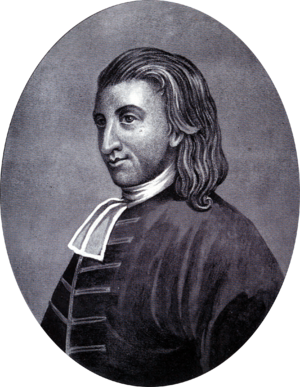Thomas Boston facts for kids
Quick facts for kids
Reverend
Thomas Boston
|
|
|---|---|

from A general account of my life
|
|
| Born | 17 March 1676 |
| Died | 20 May 1732 (aged 56) |
| Nationality | Scottish |
| Occupation | Schoolmaster, church leader, philosopher |
|
Notable work
|
Human Nature in Its Fourfold State |
| Theological work | |
| Tradition or movement | Marrow Brethren |
| Notable ideas | Free offer of the gospel, Assurance, Republication of the Covenant of Works |
Thomas Boston (born March 17, 1676 – died May 20, 1732) was an important Scottish Presbyterian church leader. He was also a theologian (someone who studies religion) and a philosopher (someone who thinks deeply about life and knowledge).
Boston worked as a schoolmaster and later became a minister in different towns in Scotland. His most famous book is Human Nature in Its Fourfold State. It is considered a classic religious book in Scotland. He also wrote The Crook in the Lot, a unique short book. Thomas Boston was known for being very religious and kind. His own story, written by himself, gives an interesting look into Scottish life long ago.
Contents
Life Story
Thomas Boston was born in Duns, Scotland. His parents, John Boston and Alison Trotter, were both Covenanters. Covenanters were a group of Scottish Presbyterians who promised to uphold their religion.
He studied in Edinburgh and became a minister in 1699. His first church was in a small town called Simprin. Before that, he worked as a schoolmaster in Glencairn.
The Marrow Controversy
In 1704, Boston found an old book called Marrow of Modern Divinity. This book was about how God's grace (his kindness and help) is freely given to everyone. It said that people don't need to do good things first to receive God's help. Instead, if they truly believe in Christ, good actions and a new life will naturally follow.
Boston really liked this book. He helped get it reprinted in 1718, and he even added his own notes to it. However, some church leaders disagreed with the book's ideas. This led to a big debate in the church called the "Marrow Controversy." Boston strongly defended the book.
The people who supported The Marrow were known for being very enthusiastic in their church work. They were also known for their powerful preaching.
Moving to Ettrick
In 1707, Boston moved to Ettrick, Scotland, to become the minister there. He was the only person in a church meeting who spoke out against a light punishment given to a professor. This professor was accused of teaching ideas that were not fully accepted by the church.
Thomas Boston's own writings and his devoted work as a minister helped make the ideas from The Marrow very popular. Many people came from all over to attend his church services. He was a very important person in the Scottish church during his time.
Family Life
Thomas Boston got married on July 17, 1700, to Katherine Brown. They had many children together:
- Katharine, born in 1701, died young.
- John, born in 1702, later worked for the Duke of Buccleuch.
- Robert, born in 1704, died young.
- Jane, born in 1705, later married James Russell.
- Ebenezer, born in 1707, died young.
- Ebenezer, born in 1708, died young.
- Thomas, born in 1710, died young.
- Alison, born in 1711, later married James Anderson.
- Thomas, who became a minister like his father.
- Katharine, born in 1715, died young.
Works and Writings
Thomas Boston wrote many books and sermons. His own life story, called his autobiography or Memoirs, tells us a lot about Scottish life back then.
His most famous book is Human Nature in Its Fourfold State. It is a very important religious book in Scotland. Another well-known book is The Crook in the Lot, which is a short and original work. He also wrote about theology in his Body of Divinity and other Miscellanies. These books were very popular among ordinary Scottish people.
Boston also wrote a detailed book about Hebrew points, which are special marks in the Hebrew Bible. His Memoirs were published in 1776. All his works were collected into 12 volumes in 1849.
Some of his works
- Human Nature in its Four-fold Estate (1720) - his most famous book.
- Notes to the Marrow of Modern Divinity (1726) - his thoughts on the book he defended.
- A View of the Covenant of Grace (1734)
- Thomæ Boston, ecclesiæ Atricensis apud Scotos pastoris, Tractatus Stigmologicus, Hebræo-Biblicus (1738) - his scholarly work on Hebrew accents.
- The Crook in the Lot - a popular short book.
- Memoirs - his autobiography.
- Body of Divinity
- Miscellanies
You can find some of his works online:
- The Crook in The Lot
- Human Nature in its fourfold state
In Literature
Thomas Boston's writings and life have been mentioned in other famous works:
- The Scottish poet Robert Burns mentioned Boston in his poem "Letter to James Tail of Glenconner." He wrote about reading Boston's works.
- The author Alice Munro mentioned Boston in her short story "No Advantages" (from The View from Castle Rock, 2006). She described how Boston wrote about his own struggles and feelings of unworthiness.
- Boston is also quoted in another one of Alice Munro's short stories, "A Wilderness Station" (1992).
 | DeHart Hubbard |
 | Wilma Rudolph |
 | Jesse Owens |
 | Jackie Joyner-Kersee |
 | Major Taylor |

